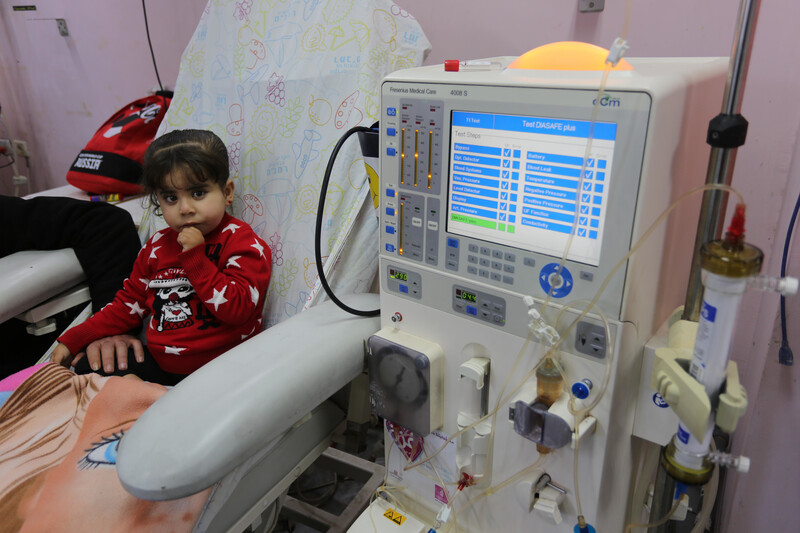Rights and Accountability 27 November 2019

A child receives medical treatment in al-Rantisi children’s hospital in Gaza City in January 2019. There are hundreds of cases of Palestinian children traveling to Israel and the West Bank without a parent for medical treatment unavailable in Gaza each month.
APA imagesChildren being made to endure lengthy medical treatments alone is a particularly cruel feature of Israel’s permit regime imposed on Palestinians in the occupied West Bank and Gaza Strip.
It is a shameful reality that COGAT, the Israeli military body that handles such permits, tries to obscure with liberal use of emojis on its social media pages.
I have previously written about how COGAT tries to present itself as a humanitarian body in its social media propaganda while it plays a central role in Israel’s complete and unjust system of control over Palestinian movement.
For example, COGAT describes its restrictions on the movement of millions of Palestinians, such as military checkpoints, as projects which “improve the quality of life of the region’s population.”
It even put out a video last week boasting of a “service revolution” following the launch of “an advanced call center” through which its Civil Administration “provides clear responses on all topics, to everyone”:
The absurdity of COGAT’s Civil Administration representing itself as providing services might be funny if it didn’t inflict so much harm and pain on Palestinian families.“Profoundly devastating”
According to a new report, Israel approved fewer than half of the applications submitted by parents seeking permission to travel with their children referred for medical treatment outside Gaza between February and September last year.
COGAT told Physicians for Human Rights Israel, which authored the report, that the number of approved permits has improved since then. But the rights group says there are still “hundreds of cases of children traveling for medical treatment without at least one parent every month.”
Children traveling with a distant relative or even a stranger to medical facilities in Israel and the West Bank “is a manifestation of the profoundly devastating implications of the permit regime for Palestinian society in general, and in the Gaza Strip in particular,” the group states.
Palestinians in Gaza cannot freely travel to Israel or the West Bank. To do so, they must submit an application through Palestinian Authority interlocutors for an Israeli permit.
Parents wishing to accompany their child for medical treatment unavailable in Gaza, which has been under Israeli blockade for more than 12 years, must undergo a security check which may take months.
As a result, “children’s access to treatment or surgery is sometimes delayed for many months, or eventually even completely denied,” according to Physicians for Human Rights Israel.
A child may be separated from their parents during treatment, as was the case of a 3-year-old boy who spent 43 days without his mom or dad as he underwent chemotherapy in a West Bank hospital earlier this year.
It is a traumatizing experience for children forced to undergo medical treatment without one of their parents. Children hospitalized with a parent accompanying them “react faster to treatment and have stronger vital signs,” Physicians for Human Rights Israel reports, summarizing the findings of the head nurse of a Jerusalem hospital’s pediatric intensive care unit.
The report adds that sudden separation of nursing babies from their mothers has “serious psychological implications and prolongs treatment.”
Subcontractor carrying out Israeli policy
Parents in Gaza are meanwhile discouraged by the Palestinian Civil Affairs Committee from submitting applications to accompany their children since they are unlikely to be approved. The committee recommends that permits be sought for grandparents instead.
“This effectively blocks any possibility for the parents to accompany their children,” Physicians for Human Rights Israel states. “Instead of fighting Israeli policy,” the committee acts as “a subcontractor that carries out their policy.”
Israeli medical institutions meanwhile defer to so-called security needs over the wellbeing of patients.
“The readiness displayed by medical staff to adjust and lower their demands when dealing with the security establishment effectively leads to completely different treatment standards being applied according to population type,” the group states.
The result is “a policy that systematically and continuously violates the right to health of children from the Gaza Strip and their chances of recovery.”
It’s an appalling reality endured by a great number of families in Gaza – more than 5,000 permits have been issued to children needing medical treatment so far in 2019.
There’s nothing humanitarian about COGAT and the cruel military occupation which it facilitates.





